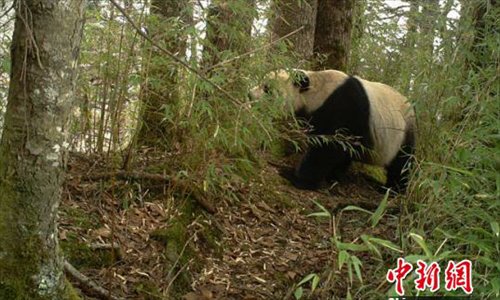Draft law to recognize animal welfare
Experts say amendment reflects increased concern among general public

A rare wild panda is caught on film with an infrared camera at Baishuijiang National Nature Reserve in Longnan, Gansu Province. According to He Liwen, an employee at the reserve, a total 80 cameras installed throughout the area have captured 19 photos of wild giant pandas, all of which reveal the pandas to be in good health. Photo: Courtesy of Baishuijiang National Nature Reserve/Chinanews.com
Chinese lawmakers will for the first time recognize animal welfare in wildlife protection law, an expert working closely on the law's amendment told the Global Times on Tuesday.
Chang Jiwen, vice director of the Research Institute of Resources and Environment Policies under the Development Research Center of the State Council, revealed that a draft amendment to the Law on Wildlife Protection has been completed by the environment committee of the National People's Congress (NPC).
"The recognition of animal welfare is a big highlight of the draft, which fits with the eco-friendly direction of policy," Chang said.
A lack of awareness around wildlife welfare has resulted in increasing deaths, random killings and maltreatment of wild animals, Chang said.
The amendment is still under discussion, Chang said. It will be submitted to the NPC's legal committee for further revision, and will be reviewed by the NPC Standing Committee by the end of 2015.
The "animal welfare" referred to in the draft will only apply to wildlife and wild animals in human captivity, Chang added.
This recognition is only a first step, Chang said, as many problems remain unsolved, including separate standards for different aspects of animal welfare. For instance, farmers should provide wild animals with certain living condition and should not maltreat them.
Shi Kun, director of the Wildlife Institute at Beijing Forestry University, told the Global Times that China has long been criticized for not treating wild animals humanely, but with legal recognition of animal welfare, the country should be able to make progress on curbing phenomenon like overtime performance by zoo animals and harsh living conditions for wildlife on farms.
This September, four monkey trainers were convicted for illegally transporting rare wild animals, sparking a nationwide debate over "cruel" monkey street performances.
Zhang Wei, dean of the College of Wildlife Resources of Northeast Forestry University, has visited more than 60 bear farms in the past few years.
He told the Global Times that the living conditions on large bear farms have improved significantly, and that the bears he saw were in good condition.
Legislators' recognition of animal welfare is significant for wildlife protection, Zhang said. "But Chinese society has improved a lot in terms of caring for animals."
Zhang warned that animal welfare should not be exaggerated, as some wildlife might lose their natural instincts if they are cared for excessively, while Chang believes that all practices beneficial to animals could be categorized as "animal welfare."
The draft amendment also touches upon other areas, including controversial topics such as permitting the raising and sale of endangered wildlife. Though the Criminal Law bans buying or eating wildlife, some people believe that it should be permitted for certain species when artificial breeding has reached certain scale.